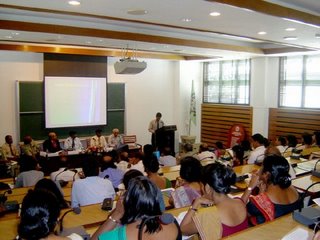 Annual Sessons at Auditorium of the National Institute of Education, Maharagama
Annual Sessons at Auditorium of the National Institute of Education, Maharagama 
Professional body of Sri Lankan Biologists, incorporated by an Act of Parliament in 1984
Biology is the scientific study of living things. From the traditional division into zoology and botany, biosciences have developed which span their limits. Disciplines such as micorbiology, biotechnology, forestry, horticulture, agriculture, fisheries, oceanography, marine biology, biochemistry, palaeontology and medicine have a strong basis in biology. Biology has the potential to help solve many of the current problems, a number of which stem from overpopulation and the strain that our sheer numbers place on ecological systems. Because of the population growth, human beings are now exhausting the limited resources that support the life on our small planet.
Biologists have identified and defined these valuable resources as bio-diversity. Biological diversity or Biodiversity refers to the variety of life forms: the different plants, animals and micro-organisms, the genes they contain, and the ecosystems they form. This living wealth is the product of hundreds of millions of years of evolutionary history. Humanity derives all of its food and many medicines and industrial products from the wild and domesticated components of biological diversity. Biotic resources also provide many ecological services. As
Several biologists are now involved in forestry. Forestry sector has economic linkages to the energy sector by providing bio-energy (fuelwood) and protection of catchment areas serving hydropower generation. Forestry also contribute indirectly to agriculture sector by conserving soil and water. It provides industry sector with the much needed supply of wood and other forest based raw materials. Although, official statistics indicate that forestry sector provides 1.4% to the GNP (in 1993), the true contribution to the economy by this sector is much greater. Forestry also provides other tangible and intangible benefits.
In the area of biotechnology, biologists are now applying discoveries in biology to eco-friendly production of useful organisms and their products. It centers on development of enzyme technology in industry and medicine, and of gene manipulation, often utilized in plant and animal breeding. Together, these constitute biomolecular engineering. Branches include fermentation technology, waste technology and renewable resources technology, such as the use of lignocellulose to generate more usable energy sources. Micro-organisms, and their traditional involvement in brewing, baking and cheese/ yogurt industries is also affected by the technology.
Sri Lankan biologists have contributed immensely in conserving natural resources, particularly natural wet-zone forests. Botanists and zoologists have conducted detailed studies on the biodiversity of
It is essential to concentrate our efforts on dissemination and development of knowledge in the fields of management and eco-friendly utilization of biological resources to achieve the economic development.
Presidential Address, at the Theme Seminar on Biology for Eco-friendly development at the Seventeenth Annual Sessions of the Institute of
Presently major part of the wood working industry is owned by private sector. Many studies carried out in the past have revealed, that most of the wood based industries were based on traditional technology, using out dated equipment. It was further revealed that most of the personnel engaged in the industries were inadequately trained and did not have the technical competence to perform relevant activities. This has resulted in high losses in conversion, in this industry. It is also necessary to have more value addition for various products. The industry has been in the state of underdevelopment for over a period of 20 years and as a result have lost touch with the new trends in the industry, new technology etc. It is interesting to note that there is no single state agency responsible for providing the necessary support, skills; both technical and managerial for upgrading the wood working industry in the country. Various agencies are dealing with aspects relating to wood working industry, but is not geared towards providing most of the support required for developing the industry.
Moratuwa is considered as the prime location for the wood working industry in the country. However, the industry has been on the decline over the past two decades which has had serious impact on the economic setting of the area and on the livelihood of the people dependent on the industry. It is estimated that there are over 10,000 people employed in the wood working industry in Moratuwa alone. The wood working industry in Moratuwa consists mainly of furniture. In order to be competitive in the domestic as well as in the international market the industry has to produce outputs of high quality, including superior finish and good designing. However, the industry lacks the know how and skills for quality production, the necessary technology or equipment for such production and also to produce designs to cater for the current market demand.
Much discussion have taken place over the years where the need for upgrading the wood working industry has been emphasized, but very little initiatives have been made while the industry is slowly being destroyed. This situating cannot continue any further.